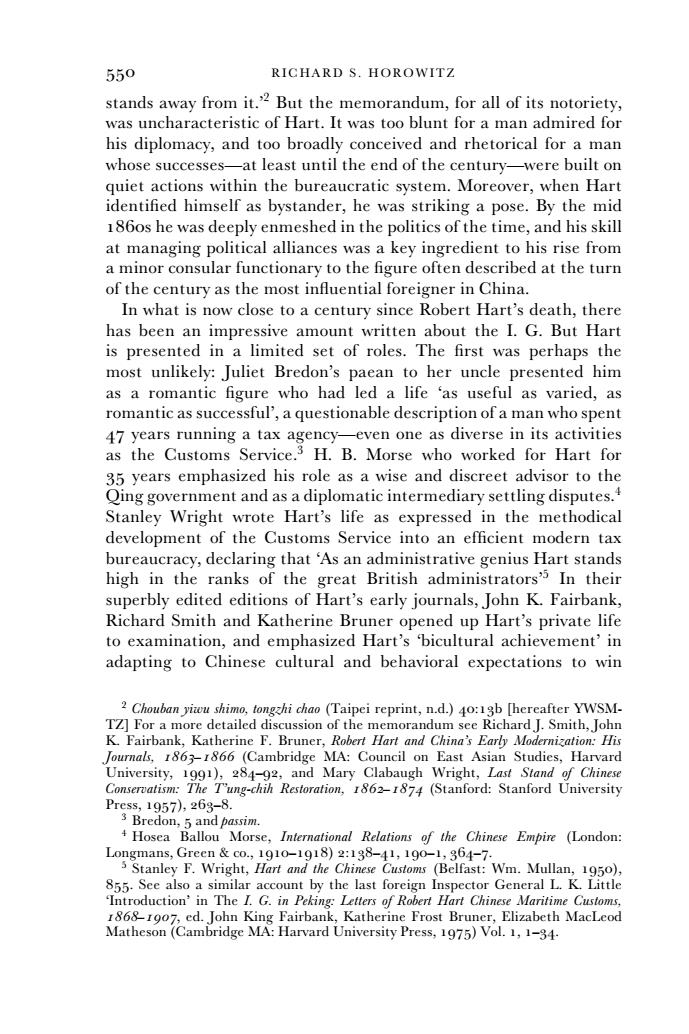正在加载图片...

550 RICHARD S.HOROWITZ stands away from it.2 But the memorandum,for all of its notoriety, was uncharacteristic of Hart.It was too blunt for a man admired for his diplomacy,and too broadly conceived and rhetorical for a man whose successes-at least until the end of the century-were built on quiet actions within the bureaucratic system.Moreover,when Hart identified himself as bystander,he was striking a pose.By the mid 186os he was deeply enmeshed in the politics of the time,and his skill at managing political alliances was a key ingredient to his rise from a minor consular functionary to the figure often described at the turn of the century as the most influential foreigner in China. In what is now close to a century since Robert Hart's death,there has been an impressive amount written about the I.G.But Hart is presented in a limited set of roles.The first was perhaps the most unlikely:Juliet Bredon's paean to her uncle presented him as a romantic figure who had led a life 'as useful as varied,as romantic as successful',a questionable description of a man who spent 47 years running a tax agency-even one as diverse in its activities as the Customs Service.3 H.B.Morse who worked for Hart for 35 years emphasized his role as a wise and discreet advisor to the Qing government and as a diplomatic intermediary settling disputes.4 Stanley Wright wrote Hart's life as expressed in the methodical development of the Customs Service into an efficient modern tax bureaucracy,declaring thatAs an administrative genius Hart stands high in the ranks of the great British administrators'5 In their superbly edited editions of Hart's early journals,John K.Fairbank, Richard Smith and Katherine Bruner opened up Hart's private life to examination,and emphasized Hart's bicultural achievement'in adapting to Chinese cultural and behavioral expectations to win 2 Chouban yiwu shimo,tongzhi chao (Taipei reprint,n.d.)40:13b [hereafter YWSM- TZ]For a more detailed discussion of the memorandum see Richard J.Smith,John K.Fairbank,Katherine F.Bruner,Robert Hart and China's Early Modernization:His Journals,1863-1866 (Cambridge MA:Council on East Asian Studies,Harvard University,1991),284-92,and Mary Clabaugh Wright,Last Stand of Chinese Conservatism:The T'ung-chih Restoration,1862-1874 (Stanford:Stanford University Press,1957),263-8. 3 Bredon,5 and passim. Hosea Ballou Morse,International Relations of the Chinese Empire (London: Longmans,Green&co,1910-1918)2:138-41,190-1,364-7. 5 Stanley F.Wright,Hart and the Chinese Customs (Belfast:Wm.Mullan,1950), 855.See also a similar account by the last foreign Inspector General L.K.Little Introduction'in The I.G.in Peking:Letters of Robert Hart Chinese Maritime Customs, 1868-1907,ed.John King Fairbank,Katherine Frost Bruner,Elizabeth MacLeod Matheson (Cambridge MA:Harvard University Press,1975)Vol.1,1-34.550 RICHARD S. HOROWITZ stands away from it.’2 But the memorandum, for all of its notoriety, was uncharacteristic of Hart. It was too blunt for a man admired for his diplomacy, and too broadly conceived and rhetorical for a man whose successes—at least until the end of the century—were built on quiet actions within the bureaucratic system. Moreover, when Hart identified himself as bystander, he was striking a pose. By the mid 1860s he was deeply enmeshed in the politics of the time, and his skill at managing political alliances was a key ingredient to his rise from a minor consular functionary to the figure often described at the turn of the century as the most influential foreigner in China. In what is now close to a century since Robert Hart’s death, there has been an impressive amount written about the I. G. But Hart is presented in a limited set of roles. The first was perhaps the most unlikely: Juliet Bredon’s paean to her uncle presented him as a romantic figure who had led a life ‘as useful as varied, as romantic as successful’, a questionable description of a man who spent 47 years running a tax agency—even one as diverse in its activities as the Customs Service.3 H. B. Morse who worked for Hart for 35 years emphasized his role as a wise and discreet advisor to the Qing government and as a diplomatic intermediary settling disputes.4 Stanley Wright wrote Hart’s life as expressed in the methodical development of the Customs Service into an efficient modern tax bureaucracy, declaring that ‘As an administrative genius Hart stands high in the ranks of the great British administrators’5 In their superbly edited editions of Hart’s early journals, John K. Fairbank, Richard Smith and Katherine Bruner opened up Hart’s private life to examination, and emphasized Hart’s ‘bicultural achievement’ in adapting to Chinese cultural and behavioral expectations to win 2 Chouban yiwu shimo, tongzhi chao (Taipei reprint, n.d.) 40:13b [hereafter YWSMTZ] For a more detailed discussion of the memorandum see Richard J. Smith, John K. Fairbank, Katherine F. Bruner, Robert Hart and China’s Early Modernization: His Journals, 1863–1866 (Cambridge MA: Council on East Asian Studies, Harvard University, 1991), 284–92, and Mary Clabaugh Wright, Last Stand of Chinese Conservatism: The T’ung-chih Restoration, 1862–1874 (Stanford: Stanford University Press, 1957), 263–8. 3 Bredon, 5 and passim. 4 Hosea Ballou Morse, International Relations of the Chinese Empire (London: Longmans, Green & co., 1910–1918) 2:138–41, 190–1, 364–7. 5 Stanley F. Wright, Hart and the Chinese Customs (Belfast: Wm. Mullan, 1950), 855. See also a similar account by the last foreign Inspector General L. K. Little ‘Introduction’ in The I. G. in Peking: Letters of Robert Hart Chinese Maritime Customs, 1868–1907, ed. John King Fairbank, Katherine Frost Bruner, Elizabeth MacLeod Matheson (Cambridge MA: Harvard University Press, 1975) Vol. 1, 1–34